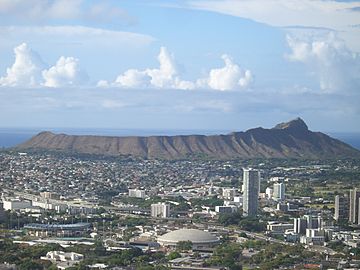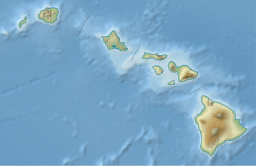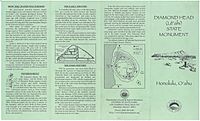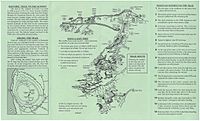Diamond Head, Hawaii facts for kids
Quick facts for kids Diamond Head |
|
|---|---|

Diamond Head cone seen from Tantalus-Round Top Road
|
|
| Highest point | |
| Elevation | 762 ft (232 m) |
| Prominence | 596 ft (182 m) |
| Geography | |
| Location | Honolulu, Hawaii, US |
| Parent range | Hawaiian Islands |
| Topo map | USGS Honolulu |
| Geology | |
| Age of rock | 200,000 years |
| Mountain type | Volcanic cone |
| Last eruption | Unknown |
| Climbing | |
| Easiest route | Trail |
| Designated: | 1968 |
Diamond Head is a famous volcanic cone on the island of Oʻahu in Hawaii. It's a special type of volcano called a tuff cone. This means it was formed by ash and rock fragments exploding from a volcano.
Hawaiian people know it as Lēʻahi (pronounced [leːˈʔɐhi]). This name probably comes from lae (meaning brow or promontory) and ʻahi (meaning tuna fish). The shape of the mountain's ridge looks like a tuna's dorsal fin. British sailors gave it the name "Diamond Head" in the 1800s. They thought the shiny calcite crystals on the nearby beach were diamonds.
Contents
What is Diamond Head?
Diamond Head is part of a group of volcanoes and vents. Geologists call this group the Honolulu Volcanic Series. These volcanoes formed long after the main Koʻolau Volcano became quiet.
These eruptions created many well-known places on Oʻahu. Some examples are Punchbowl Crater, Hanauma Bay, and Koko Head.
Diamond Head is much younger than the Koʻolau Mountain Range. The Koʻolau Range is about 2.6 million years old. But Diamond Head is only about 400,000 to 500,000 years old.
A Look at Its History
The mountain was called Lēʻahi by the native Hawaiians. In 1825, British sailors named it Diamond Hill. They found sparkling volcanic crystals in the sand. They mistakenly thought these crystals were diamonds. This is why another local name for it is Kaimana Hila. The name later became Diamond Head. The word "head" is a shorter way of saying "headland," which means a piece of land sticking out into the sea.
The inside and outside areas of Diamond Head were once home to Fort Ruger. This was the first United States military base in Hawaii. Today, only a few parts are still used by the military. These include Battery 407 and Birkhimer Tunnel. The tunnel is the headquarters for the Hawaii State Civil Defense. An FAA air traffic control center also operated here from 1963 to 2002.
Visiting Diamond Head
Diamond Head is a very famous sight in Waikiki. It is also a U.S. National Natural Monument. A small part of it is closed to visitors. This area is used for antennas by the U.S. government.
However, most of the crater is open to the public. It is very close to Honolulu's hotels and beaches. This makes it a popular place for both locals and tourists to visit.
National Natural Landmark
In 1968, Diamond Head was named a National Natural Landmark. The crater, also called Diamond Head Lookout, was important for military defense. In the early 1900s, it was used as a strategic lookout point.
It covers over 475 acres (190 hectares). This includes the inside of the crater and its outer slopes. It was a great defensive spot because it offers wide views of Waikiki. It also overlooks the entire south shore of Oahu.
The Diamond Head Lighthouse is right next to the crater's slopes. This lighthouse helps guide ships and was built in 1917. You can also find a few old military pillboxes at the very top of Diamond Head.
Diamond Head in Pop Culture
Diamond Head has appeared in many different forms of popular culture.
- In 1952, it was featured on an 80-cent air mail stamp. This stamp was used to send orchids to the U.S. mainland.
- The 1963 film Diamond Head starred Charlton Heston.
- An instrumental song called "Diamond Head" was recorded by The Ventures in 1964. It became a huge hit around the world. It was especially popular in Japan, selling over a million copies.
- A TV game show called The Diamond Head Game was set there in 1975.
The crater was also a popular spot for concerts in the 1960s and 1970s. These were often called Hawaiian Woodstock or Diamond Head Crater Festivals. They were also known as Sunshine Festivals. These all-day music events started on New Year's Day in 1969. They attracted huge crowds, sometimes over 75,000 people. Famous bands like the Grateful Dead, Santana, and Journey played there. Hawaiian artists like Cecilio & Kapono also performed.
In 1976 and 1977, the festivals became two-day events. However, they were later canceled by the Hawai'i Department of Land and Natural Resources. This was due to concerns about noise and environmental impact on the community. Many band items were brought in and out of the crater by helicopter.
Images for kids
-
View from Rocky Hill, which resides over Punahou School
-
Diamond Head peak from Kapiolani Park
-
Waikiki Beach facing Diamond Head, 1958
See also
 In Spanish: Diamond Head (Hawái) para niños
In Spanish: Diamond Head (Hawái) para niños
 | Bayard Rustin |
 | Jeannette Carter |
 | Jeremiah A. Brown |














